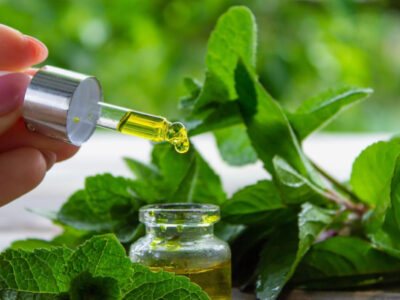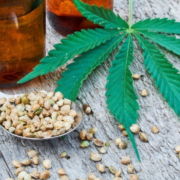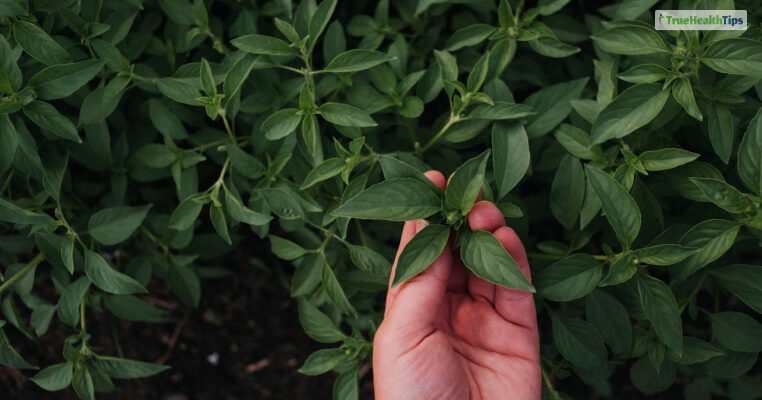
Tulsi, also known as holy basil is a sacred plant that is widespread in countries such as India. It has several health benefits for the consumer’s skin, but it also has special properties that make it good for your hair.
There are several benefits of the holy basil you can reap, such as how it can help with hair loss. Well-known characteristics of Ocimum family are from the texts in Ayurveda that show how it helps get rid of cough, and controls hypertension.
This article will go beyond its place within diet in diabetes, and explore all the benefits for hair, answering the question if it really helps combat hair loss!
Holy Basil! Are they all the same?
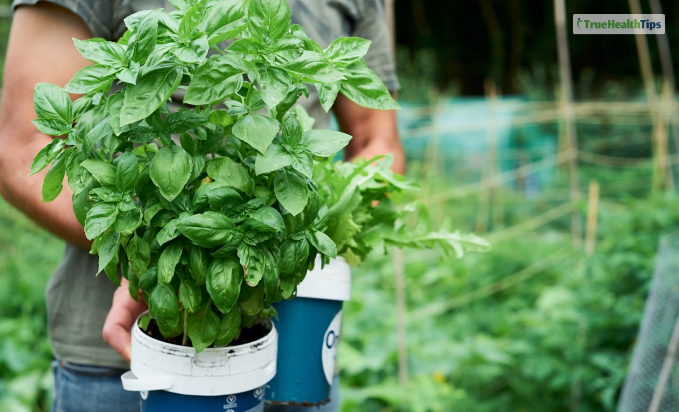
There are different types of plants that belong to the Ocimum species, these are used for different purposes in different parts of the world. For example, in Italy, Ocimum basilicum Genovese is one of the most popular basil types that people consume.
Yes, the basil they add to their pizzas and pastas. It has several health benefits, even skin benefits for the consumer, but the benefits for hair are not quite well explored. The following article will discuss the benefits of Tulsi that belongs to the Ocimum sanctum, O. tenuflorum, and O. basilicum, among others.
You do not necessarily have to procure these types of basil leaves to reap the benefits, but these are quite common. It is also important that you consult your physician to know if it’s safe for you.
Precautions with the use of Tulsi for hair
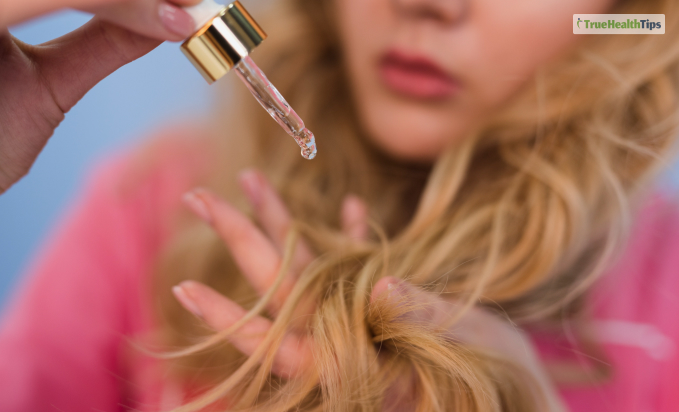
Tulsi benefits for hair can be enticing, but you should be careful about its usage too. Following are some of the precautions you should take while applying Tulsi on your hair:
- Perform a patch test to ensure you are not allergic to Tulsi. This will help you prevent any severe reaction to its usage. You can also consult your physician to find out if Tulsi is suitable for you.
- Do not use Tulsi powder more than once or twice a week. It may cause dryness in your scalp.
- You may also experience redness or rashes on your scalp if you overuse the herb.
- Breastfeeding and pregnant women should consult a healthcare professional before trying any form of Tulsi.
- Moreover, because it helps with dandruff and fungal infections, there are chances you may further irritate your skin. Thus, be careful about the frequency of using Tulsi for your hair.
Benefits Of Tulsi Benefits For Hair
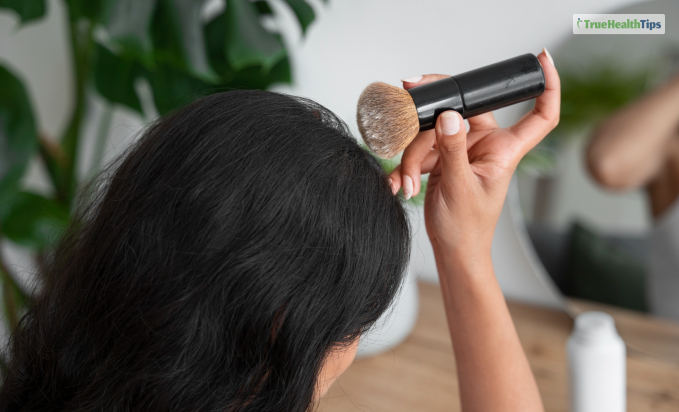
The type of basil you procure will not make a huge difference, but it is good to know what you are consuming and why you should include it in your diet.
Antimicrobial Properties
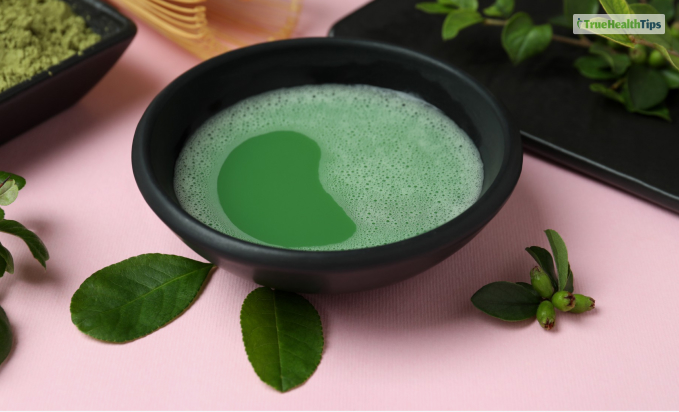
One of the most important properties of Tulsi is that it has antimicrobial properties meaning it can easily inhibit the growth of pathogenic microorganisms such as bacteria and fungi that can grow on the scalp.
Be it Tulsi leaves or extracts that you use, you can reap several benefits, one of which is its ability to fight scalp infections. It is a great agent that can fight microbial invasion of your scalp. Thus, helping maintain a healthy scalp.
This can help prevent itchiness, flakiness and dandruff, all three of which can increase due to the action of microorganisms that love staying on the skin. Because hair and skin health are so closely connected, you can also find skin benefits of Tulsi.
The antimicrobial property of Tulsi helps in maintaining good skin health, as it can help prevent skin infections. You might already know that the gut harbors millions of bacteria that can help maintain good health.
Similarly, skin also has millions of microorganisms that perform various functions. Amongst them, there are cases of bacteria turning pathogenic when they find an environment that is suitable for their growth. This changes their characteristics from being beneficial to harmful.
With the help of Tulsi, you can improve your chances of preventing such a switch, thus, helping you maintain good scalp health.
Stimulates Hair Growth

The Holy Basil houses several active agents that can stimulate various functions in the body. One of those is its ability to stimulate blood flow to the scalp, which thus helps in promote hair growth.
One of the most important factors to help hair growth is stimulation of blood flow, this helps invigorate the follicles so that they can grow healthily. This helps in providing the right nutrients to the follicles, thus building a healthy scalp.
A healthy scalp that receives the right nutrients is naturally stronger. And this facilitates the growth of healthier hair that is also shiny and voluminous!
Strengthens Hair
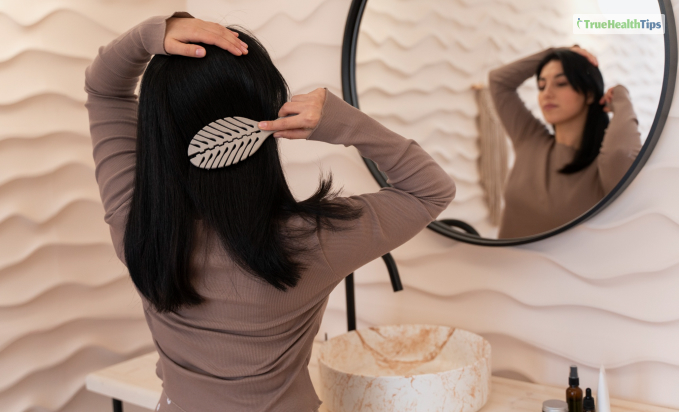
Continuing the previous point, a healthy scalp is easily able to promote proper strength of hair. This helps in keeping the hair roots strong which protects your hair from breakage. The essential vitamins and minerals in Tulsi such as magnesium, iron and protein help in strengthening the hair shaft.
These minerals and vitamins are also helpful in reducing hair fall, this is through its action of strengthening the existing strands.
Moreover, because it helps promote blood circulation, it is also helpful in promoting the strength from the roots. This helps prevent breakage and split ends, which can preserve your locks.
Natural Conditioner

The minerals and vitamins that are present in the Holy Basil are not just helpful in reducing the health ailments in humans, they are also a great conditioner! Why waste dollars on conditioners that increase scalp build up and have short-term conditioning effects?
Try using Tulsi leaves as your natural conditioner, obviously after getting the green signal from your dermatologist or physician. The natural conditioning properties of Tulsi add a shine to your hair that adds shine, making it look lustrous.
Using Tulsi will help in moisturizing your hair that can make it more manageable and thus, smoother. You can either use Tulsi powder or use the oil to massage your scalp to reap the benefits. Alternatively, you can also make a versatile hair mask that can serve the purpose of a conditioner and a scalp cleanser.
Prevents Premature Greying

Did you know, one of the Tulsi benefits for hair includes its role in preventing premature greying! Say bye to your greying problems (unless you like flaunting a salt and pepper look or a natural silver blonde.)
The antioxidant properties of Tulsi help in protecting the hair from free radical damage. This delays the onset of premature grey hair.
So, what are you waiting for? Consult your doctor and start using Tulsi to breathe life back into your hair.
That was all on the Tulsi benefits for hair, by using the herb in any of its forms, you can ensure you are enjoying a healthy scalp and hair.
3 DIY Tulsi Hair Care Recipes
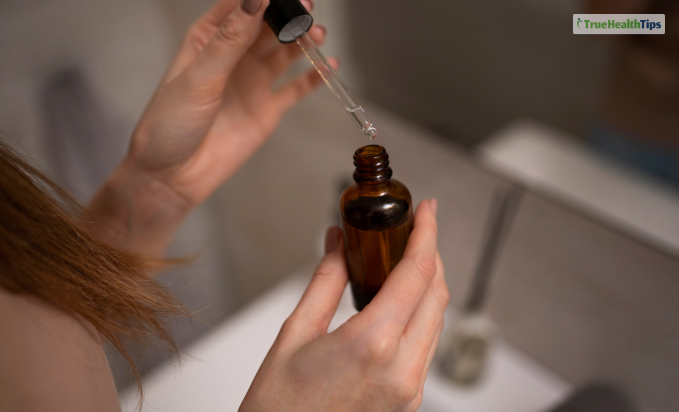
Now that you know the Tulsi benefits for hair, you can boost your hair health! Here are the different ways you can use the herb to improve your hair health. Let’s have a look at all the ways you can incorporate Tulsi in your hair care routine:
- Tulsi hair oil: There are several ways you can reap Tulsi benefits for hair. One of those includes using Tulsi hair oil. It is not common to find readymade Tulsi oils, don’t worry, you can make it at home!
No, I am not talking about the highly concentrated essential oils such as lavender oil. To reap the Tulsi benefits for hair, you can make a Tulsi-infused oil. Heat a handful of Tulsi leaves in a bowl containing your carrier oil of choice. It can either be coconut or almond oil, both have respective benefits for hair health.
Heat the oil containing the leaves for a few seconds (30 seconds to 1 minute.) This will help you extract the active ingredients into the oil, which you can then apply before shampooing. Cool down the oil till you can comfortably touch it without feeling a burn on your fingers.
Alternatively, you can apply the oil, massage your scalp and keep it overnight if you have dry scalp. Avoid doing this if you have oily or combination skin.
- Tulsi hair mask: You can make a Tulsi mask with the help of Tulsi powder or using fresh Tulsi leaves to make a paste. Depending on the length of your hair, take enough Tulsi powder or fresh Tulsi leaf paste in a bowl and add aloe vera gel (if you have a dry or combination scalp.)
If you have an oily scalp use yogurt to say bye to your hair woes.
Alternatively, you can take it a step further by mixing Tulsi paste with honey and yogurt. This will help you create a deep conditioning mask for your lustrous locks.
- Tulsi Rinse: This is a fun little concoction that can be used as a quick fix to cool your scalp and control itching. Take a handful of Tulsi leaves and boil them in water for around 30 minutes. Let this mixture cool down, you can store it in a spray bottle to use it twice or thrice a week. Or you can make it once every week for immediate use.
Use any of the DIY hair care recipes for your hair. You can also incorporate them into your hair care routine for complete hair care.
Conclusion
Tulsi benefits for hair are numerous and this article lists them so you can reap all the benefits. The various minerals and vitamins that are present in Tulsi can help you improve your hair health.
Incorporating Tulsi in your hair care routine can help you grow stronger, healthier, and lustrous hair.
Want to more hair care hacks? Let us know in the comments below!
Read Also:

